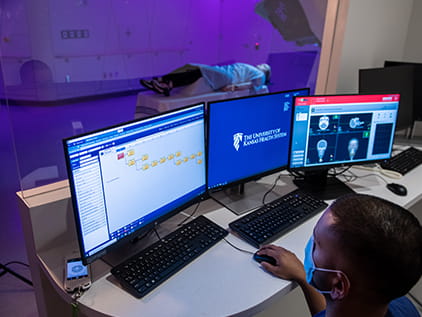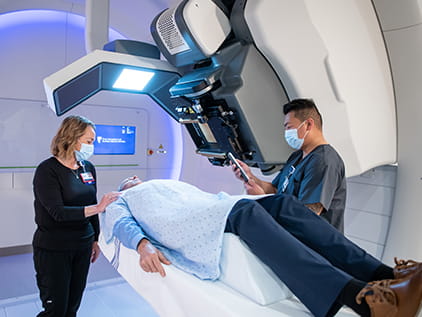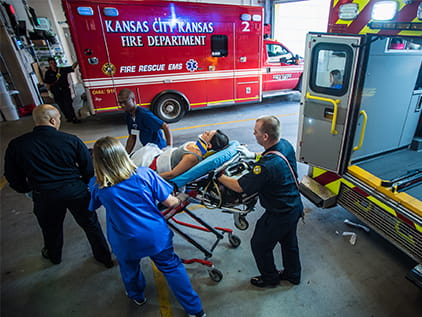Refer a Patient

The University of Kansas Health System is dedicated to delivering an unparalleled referral experience for physicians, providers and patients. We value the opportunity to collaborate with you in providing exceptional patient care.
How to refer a patient
When you refer to the health system, your patient will receive world-class care in a compassionate environment – and you will receive streamlined communication about their care.

Choose any of the following ways to refer to the health system:
Need help with a referral?
For additional support with patient referrals, contact:
Call 913-588-5862, toll-free 877-588-5862
Fax: 913-588-5785
Email: PhysRef@KUMC.edu
What to expect after you refer a patient
We prioritize prompt communication and efficient collaboration with all referring physicians. The staff and resources at the health system are always available to you.
For questions about a referral, including to check referral status, contact our physician referral representatives at 913-588-5862 or toll-free at 877-588-5862. You can also check the status of your referral in EpicCare Link.
How to access patient records and imagery
Consult with a physician
Our physicians are here to collaborate with you. To consult with a physician by phone, call 913-588-5862. A representative will assist you and collect the following information:
- The name of the physician you would like to speak with. You may also speak with someone on call.
- A brief description of the reason for your call.
- The name and date of birth of a mutual patient (if applicable).
- A call-back number in case the call is disconnected.
Once this information is obtained, the representative will connect you with the appropriate physician. If a physician is unavailable, you may speak with a nurse.

Find a doctor
Doctors at The University of Kansas Health System are leaders and researchers at the forefront of new medical discoveries. Our hundreds of specialists treat everything from primary care to complex conditions.
Why refer to the health system
The health system is here to serve you. We put patients first and we are committed to delivering a world-class experience for referring physicians and providers.
We put your patient first.
Patient safety and clinical outcomes are at the center of every decision we make. Our national distinctions showcase our commitment to delivering outstanding patient care.
We value collaboration.
Our referral process is designed to be easy and convenient. We respect your relationship with your patient and appreciate the opportunity to partner with you in providing the best care possible.
We communicate consistently.
We promise to keep you informed about your patient’s progress with open communication and rapid follow-up after your patient is seen.
We provide a compassionate patient experience.
We deliver a superior healthcare experience for every patient and prioritize patient-focused care. The health system offers complimentary concierge services for referred patients and their families. Learn more about our unmatched patient experience.
We deliver leading-edge academic medicine.
As part of an academic medical center, the health system’s knowledge, expertise and advanced technology are unparalleled in the region – and we are constantly innovating.
Explore the health system’s distinctions and awards.
Our accreditations and awards reflect our commitment to achieving healthcare excellence and providing nationally ranked care.
Our world-class National Cancer Institute-designated comprehensive cancer center is one of fewer than 60 nationwide. Only institutions demonstrating scientific excellence through a rigorous peer review process receive NCI designation. As a result, our patients have better access to clinical trials, the latest therapies and more personalized care closer to home.
We treat patients with breast, lung, prostate, sarcoma, colon, and head and neck cancers, offering increased patient access to world-renowned experts and world-class care. We also offer the region's largest blood and marrow transplant program for the treatment of complex blood cancers like leukemia and lymphoma.

The Women’s Cancer Center at The University of Kansas Cancer Center focuses exclusively on breast and gynecologic cancers. As the only National Cancer Institute (NCI)-designated comprehensive cancer center in the region, The University of Kansas Cancer Center offers more clinical trials and more treatment options.
The Women’s Cancer Center provides integrated, multidisciplinary care with a patient-centric approach for the most common cancers in women. Our team of academic experts comprises numerous female cancer specialties, including breast and gynecologic surgical oncology, breast medical oncology and breast reconstruction and plastic surgery.

The Proton Therapy Center at The University of Kansas Cancer Center is the first of its kind in the region. The University of Kansas Cancer Center is a National Cancer Institute-designated comprehensive cancer center – 1 of fewer than 60 NCI comprehensive centers in the nation and the only NCI center in the region.
When you choose The University of Kansas Cancer Center for proton therapy treatment, your patient will receive personalized, precision medicine from a multidisciplinary team of experts in cancer care.

Our team is on the leading edge of clinical research and device trials, shaping the development and future of cardiovascular medicine. With access to early feasibility studies and groundbreaking technology and resources, we can provide comprehensive cardiovascular care to people who do not have options elsewhere.
At The University of Kansas Health System, we pride ourselves on shared care. Our cardiovascular teams collaborate with physicians and patients to guarantee uninterrupted heart health services. That way patients can make it back to you smoothly.

The health system is home to the region’s only nationally verified Level I Trauma Center. We provide 24/7 on-site treatment for time-critical diagnoses, including STEMI, stroke, burns, 24/7 acute leukemia and other critical conditions. Our board-certified specialists include trauma surgeons, emergency medicine physicians, neurosurgeons, orthopedists, plastic surgeons, radiologists and nurses, providing a full spectrum of emergency care.
Our burn center is the only burn center in the region accredited for both adult and pediatric burns by the American Burn Association and the American College of Surgeons. Patients receive individualized care for complex burns and wounds, and support and resources to increase comfort and speed recovery.

Our comprehensive approach to prostate cancer care includes the most innovative treatment options. Along with providing advanced treatments, our physicians lead national and international clinical trials for early-stage, advanced and metastatic prostate cancer. Our nationally ranked urology program includes specialists in every area of urology with an exceptional level of knowledge, expertise and multidisciplinary care.

Get support from physician relations

The physician relations team partners with referring physicians and providers to give patients access to the highest level of care. From ensuring timely referrals to connecting you with one of our 1,500-plus physicians, specialty services and programs, we are here to help. We are a single, centralized point of contact for:
- Meeting coordination between you and our specialists
- Information on specialized programs and services for your patients
- Grand Rounds virtual series, CME and other educational opportunities
- Clinical trial information
- Addressing questions or concerns, meeting ongoing needs and working collaboratively
Physician newsletter
Get the latest news and updates tailored to healthcare professionals. Stay informed on advancements in technology, disease treatments and much more.

Physician Focus
Subscribe today to have our newsletter, Physician Focus, delivered to your inbox.










